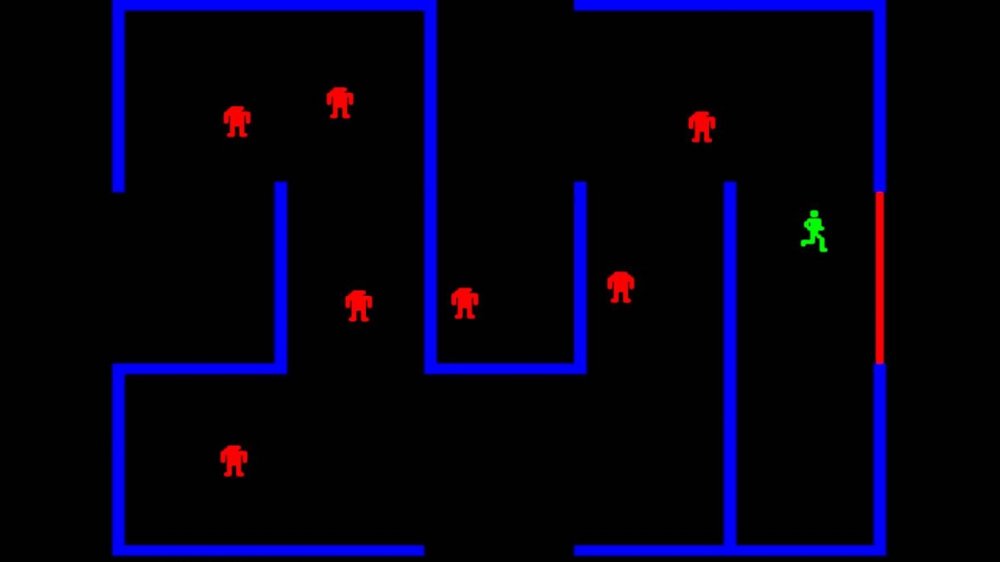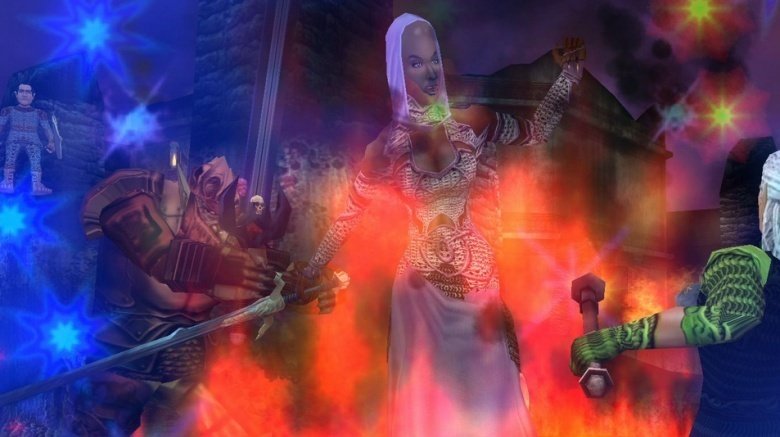Video Games That Killed People In Real Life
How many times have you died playing video games? From "Insert Coin" to "Game Over" to "it was only because of lag," most gamers have died more than Sean Bean. You might meet your end at the bottom of a pool of lava or at the hands of an enemy. In some titles, death comes with dire consequences, like starting all over from scratch; in others, it's just a blip on the way to inevitable victory.
But marauding space aliens, corrupt government operatives, and laser-shooting skeletons aren't the true dangers that lurk within your favorite video games. No, what you really need to worry about are blood clots, a lack of movement, and vulnerability to game-induced psychosis. An observer might note you sitting immobile on a couch or in an internet café, but the reality of what your body and mind are going through is pretty intense, and many unfortunate gamers have paid a high health toll for their passion.
Here are some heartbreaking stories to remind you that, unlike video games, you can't just hit "continue" in real life.
Berzerk: Heart attack
Berzerk is one of the earliest known examples of a possible link between a video game and an actual death. As reported by multiple news outlets at the time, 18-year-old Peter Bukowski landed a couple high scores on a Berzerk arcade cabinet before collapsing from a heart attack in April 1982. Bukowski was later pronounced dead at a local hospital. Though deputy coroner Mark Allen admitted stress from playing the game could have caused the attack, he also noted the presence of scar tissue on Bukowski's heart, indicating he'd suffered from a previously undiagnosed heart condition.
An October 1982 article in Video Games Magazine cited studies tying physiological reactions to video game stress that went back as far as 1977, using Pong as a stressor. It remains unclear whether the stress of playing Berzerk led to Bukowski's untimely death, or other triggers, such as a four mile trek through the snow just before the incident, were to blame.
EverQuest: Suicide
MMORPG EverQuest, called "EverCrack" or "NeverRest" by dedicated fans, has gained a reputation for its allegedly addictive nature, even catalyzing the formation of support groups for people whose relationships have suffered due to their partner's obsession with the game. Some players have reported that the social interactions, character upgrade options, and sense of community can make it difficult to log off.
Shawn Woolley took his EverQuest passion to the extreme in 2002, quitting his job to play full-time. After he ignored a Thanksgiving invitation from his family, his mother found Woolley dead in front of his computer from a self-inflicted gun wound — with EverQuest still running. Woolley took his own life for unknown reasons, but his mother speculated that it may have been related to a troubled in-game relationship or what she sees as EverQuest's addictive qualities. Former Sony Online CEO John Smedley expressed his condolences, but denied the connection.
If you or anyone you know is having suicidal thoughts, please call the National Suicide Prevention Lifeline at 1-800-273-TALK (8255).
Legend of Mir 3: Murder over a drop
High-level drops take a lot of time and energy to acquire, and thanks to the secondary market that many MMORPGs have developed, they may have a real-world dollar amount attached to them. When two players of Legend of Mir 3 argued over ownership of an in-game item, there were real-world consequences for both parties.
Qiu Chengwei acquired a high-level sword in Legend of Mir 3 and then loaned that item to Zhu Caoyuan. Before Qiu could get the sword back, Zhu sold it to a third party for $871. Unable to retrieve the object, Qiu demanded the money Zhu had made from the sale. Receiving neither, Qiu involved the police, who told him that virtual items do not have the same protection real objects do under Chinese law.
Upset, Qiu broke into Zhu's house while he was sleeping. Before Zhu could respond, Qiu stabbed Zhu in the chest, hitting his heart and puncturing a lung. Zhu died immediately. Qiu was sentenced to death by the Shanghai Number 2 Intermediate People's Court, later commuted to life in prison. He is up for parole in 2020.
Farmville: Murder
The popular Facebook game Farmville became a focal point of a tragic 2010 case of homicide involving a troubled young mother and her three-month-old son. Alexandra Tobias, 21 at the time of the incident, was playing the social farming game when her son started crying. Tobias confessed that to try and quiet the baby, she shook him at least three times.
One of those times occurred while she was at the computer, playing Farmville, and she said she may have knocked the baby's head against the computer. After the baby became unresponsive, she called the father and then the paramedics. The baby was taken to the hospital with a broken leg and head trauma. The next day, the child was pronounced dead from "abusive head trauma."
The trial revealed that Tobias had a tumultuous relationship with the baby's father. At one point things got so intense that both were booked for domestic violence a few weeks before the incident. Tobias also had a traumatic past, having found her mother dead in 2008. Despite these circumstances, the judge gave her the maximum sentence allowed by her plea, 50 years.
Nintendo Wii: Water intoxication
The Nintendo Wii was a hot item in 2007, and many gamers were eager to get their hands on one. A radio station in Sacramento, Calif. took advantage of the interest to hold a contest they called "Hold your wee for a Wii." In the competition, contestants had to drink a large amount of water without relieving themselves for a chance to win a Nintendo Wii.
One contestant, Jennifer Strange, who was 28 and the mother of three, signed up and successfully drank the two gallons of water the contest rules specified. While Strange participated in the contest, she complained to the hosts that she felt unwell, who mocked her and referenced the release she had signed, absolving them of responsibility. She placed second and received a pair of concert tickets, but no Wii.
Jennifer Strange died later that night at her Rancho Cordova home of water intoxication. Strange's husband, Billy Strange, sued the radio station for $16.5 million in compensation, successfully arguing that the radio station had knowledge of the risks and chose to ignore them.
World of Warcraft: Child neglect, murder
MMORPGs such as World of Warcraft have a reputation for attracting individuals with addictive or compulsive behaviors. The cycle of loot drops, grinds, and the social element of these games builds a compelling case to keep playing. Usually, this is no more than a matter of lost sleep before a workday. Unfortunately, it can also have deadly consequences.
In 2006, Rebecca Colleen Christie played a marathon 15-hour session of World of Warcraft. In another room, her dehydrated and undernourished daughter, Brandi, starved to death. The girl's father, Bryan Wulf, had been away for nine days, although a later investigation revealed he was aware of his wife's inability to take care of their daughter.
Christie and Wulf divorced after the child's death, and in 2009 Christie was convicted on charges of second-degree murder and child abandonment. In 2011, Christie was sentenced to prison for 25 years. The father pleaded guilty to child abuse and was sentenced to three years in prison.
Ingress: Walking into traffic
A mobile app that requires you to get up and move around seems like a great idea — until that app sends you directly into traffic, as it did Gabriel Cavalcante Carneiro Leao. While playing Ingress in 2014, the 16-year-old Brazilian teen lost track of his surroundings while rushing to a "portal" in the game, and was subsequently hit and killed by an oncoming bus.
Ingress has built-in limits to prevent certain unsafe behaviors, like features becoming unavailable while moving at high speeds. Unfortunately, there was nothing to stop an absorbed and enthusiastic kid from walking into a busy street. Sadly, Leao's death isn't the only one that can be tied back to the game. Frank Maxwell, a 48-year-old father, drowned near a pier in Ireland while playing the game in 2015.
If you play a game like Ingress, you might be tempted to give it all of your attention. Take care to watch your surroundings, though — if you don't, you could be putting yourself in real danger.
DOTA, Diablo III, Halo, StarCraft, and WoW: Marathon gameplay deaths
If there's a lesson to be learned from life-ruining games, it's that you have to get up and move around sometimes, because the list of deaths from sitting on your butt and twiddling your thumbs just keeps growing. A 2015 report in the UK's Mirror detailed the death of a boy named Rustam (last name withheld) who played Defense of the Ancients (better known as DOTA) for 22 unrelenting days.
That boy wasn't alone. In 2012, an 18-year-old named Chuang died in an internet cafe in Taiwan after 40 continuous hours of Diablo 3 — the second marathon game-related death in Taiwan that year. In 2011, Chris Staniforth died in England from deep vein thrombosis after playing 12 hours of Halo. In 2005, Lee Seung Seop died in South Korea after 50 hours of StarCraft.
Moral of the story: don't take extended gameplay lightly. Even when you're in the thick of the action, remember that you need to get up for a few minutes every so often. Take a break, stand up, get some water, and move around every once in a while during your marathon gameplay sessions.
Slender: The Arrival: Stabbing and arson
Slender: The Arrival didn't exactly kill anyone, but an obsession with its main baddie influenced a few young girls to do some insidious things. In May 2014, two 12-year-old girls from Waukesha, Wis. stabbed their classmate 19 times, believing that they had to murder someone to appease the bizarre villain (and antagonist of Slender: The Arrival as well as its low-budget predecessor, Slender: The Eight Pages).
Just as disturbing is the case of a 14-year-old girl who set her family's Port Richey, Fla. home on fire with her mother and younger brother still inside. The girl was also obsessed with Slender Man lore, and reportedly started the fire in order to gain his favor.
If these horrifying stories prove anything, it's that young children can be very impressionable. Sometimes they can have trouble separating fact from fiction. In those instances, the consequences can be deadly.
PlayerUnknown's Battlegrounds: Heart attack, stabbing
In 2020, a 12-year-old Egyptian boy named Muhammad died of a heart attack while playing PUBG Mobile on his phone. The boy, described in investigation documents as being addicted to the game and the official coroner reports attributed his death to "a sudden increase in blood pressure due to being overweight."
The tragedy elicited an extreme response from the Egyptian officials. One of the most important religious institutions in the country, the Al-Azhar body, issued a fatwa against PUBG, a religious ruling that bans the game.
While this reaction to the tragedy might seem extreme, PUBG was already on the radar of Egyptian officials after a series of violent events tied to the game. In 2018, an Egyptian high school student stabbed his chemistry teacher to death after the student allegedly "impersonated his PUBG character on his birthday."
A year after that grisly crime, two Egyptian teens were playing PUBG in Kuwait when an argument between them ended with one, a 15-year-old boy, stabbed fatally in the heart. While PUBG was again linked to the incident, reporters noted that their argument stemmed from the victim insulting the attacker's heritage.
Call of Duty: Swatting
Swatting is a criminal activity, sometimes described as a prank, that often has deadly consequences. To swat someone, an outside party makes a fake police report regarding a nonexistent violent crime to local authorities, intended to elicit a strong police response.
A swatting tragedy struck in 2017 after two Call of Duty players took their feud off the internet and involved the authorities. Casey Viner and Shane Gaskill argued over Twitter after a bad game cost them a wager, which may have been as high as two dollars. Viner threatened to swat Gaskill, who egged him on and provided a fake Wichita address.
Viner passed the address on to Tyler Barriss, who made the fake police report. Barriss claimed he lived at the location, had killed his mother, and was holding the rest of the family hostage. The police tactical team responded in force. When the resident, Andrew Finch, answered the door, he was shot by the police after lowering his hands while being ordered to keep them up.
Viner received 15 months in prison for participating in the swatting call, Barriss was sentenced to 20 years for making the call, and Gaskill was placed on deferred prosecution.
Pokémon Go: Homicide
Pokémon Go's augmented reality gameplay caught the attention of millions of gamers when it debuted in 2016. While plenty of players have caught Pokémon and explored their neighborhoods, the game has also been tied to hundreds of thousands of dollars in vehicle damage, dozens of injuries, and at least two deaths.
One of those deaths occurred in 2019 when Cayla Campos visited Bianchetti Park in Albuquerque, N.M. to find Pokémon with her boyfriend. Unfortunately, while driving they came across two people attempting to rob a car. According to her boyfriend, Campos immediately tried to turn the car around when the robbers noticed them. The robbers fired multiple shots into the vehicle, however, and one hit Campos in the neck, killing her.
The assailants left the scene, and no arrests occurred, although Izaiah Garcia was named a suspect and charged with the murder of Campos a year later.
World of Tanks: Overdose
A 24-hour charity live stream of World of Tanks came to a tragic end when Brian Vigneault died 22 hours into the event. Vigneault, who streamed under the name Poshybrid, got up from his computer and left the live stream to smoke a cigarette and never returned. The next day a friend messaged him through Discord, only to receive a response from a Virginia Beach Police Department detective. The detective informed the friend that he was investigating Vigneault's death.
Vigneault's cause of death was unknown for some time, prompting a debate about the safety of marathon streaming sessions. However, coroners later determined that Vinegault had died of a cardiac arrest resulting from the steady stream of energy drinks he had consumed during the stream alongside an accidental overdose of fentanyl.
After Vigneault's death, his viewers set up a GoFundMe page in his memory that raised over $20,000 to support his family.













